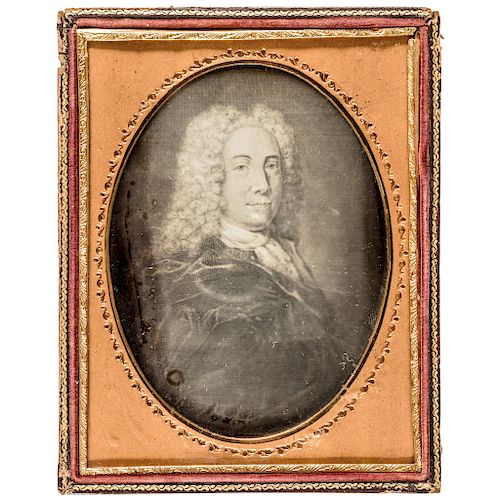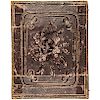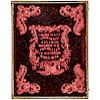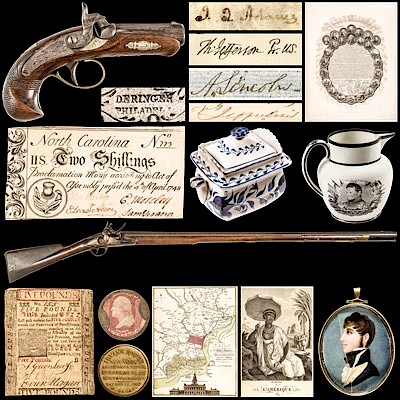Colonial Merchant Peter Faneuil Whitehurst Galleries Half Plate Daguerreotype
Lot 131
Categories
Estimate:
$600 - $900
Absentee vs Live bid
Two ways to bid:
- Leave a max absentee bid and the platform will bid on your behalf up to your maximum bid during the live auction.
- Bid live during the auction and your bids will be submitted real-time to the auctioneer.
Bid Increments
| Price | Bid Increment |
|---|---|
| $0 | $10 |
| $200 | $20 |
| $300 | $25 |
| $500 | $50 |
| $1,000 | $100 |
| $2,000 | $200 |
| $3,000 | $250 |
| $5,000 | $500 |
| $10,000 | $1,000 |
| $20,000 | $2,000 |
| $30,000 | $2,500 |
| $50,000 | $5,000 |
| $100,000 | $10,000 |
| $200,000 | $20,000 |
| $300,000 | $25,000 |
| $500,000 | $50,000 |
About Auction
By Early American History Auctions
Oct 19, 2019
Set Reminder
2019-10-19 12:00:00
2019-10-19 12:00:00
America/New_York
Bidsquare
Bidsquare : Historic Autographs-Currency-Political-Americana-Militaria-Guns
https://www.bidsquare.com/auctions/early-american-history-auctions/historic-autographs-currency-political-americana-militaria-guns-4513
326 Lots of Rare, Historic Autographs, Americana, Civil War Era, George Washington, Abraham Lincoln, Black History, Revolutionary War Era, Colonial America, Federal Period, War of 1812, Colonial Currency, Indian Peace Medals & more... Early American History Auctions auctions@earlyamerican.com
326 Lots of Rare, Historic Autographs, Americana, Civil War Era, George Washington, Abraham Lincoln, Black History, Revolutionary War Era, Colonial America, Federal Period, War of 1812, Colonial Currency, Indian Peace Medals & more... Early American History Auctions auctions@earlyamerican.com
- Lot Description
Colonial America
Remarkable Portrait of Colonial Merchant Peter Faneuil, by Whitehurst Galleries Half Plate Daguerreotype Portrait
Half Plate Daguerreotype Photograph Portrait of a Print of Colonial Merchant Peter Faneuil, with case by Whitehurst Galleries, Very Fine.
This Half Plate size Daguerreotype measures about 3.5" x 4.75" and features a handsome Portrait after an impressive early American engraved print of Peter Faneuil (1700-1743), a wealthy New York-born Colonial American Merchant, Slave trader, and Philanthropist who donated the historic "Faneuil Hall" to the town of Boston which opened in September 1742. Housed in a 4.75" x 6" full decoratively embossed early case, top loose separated at its hinge, with 19th century red velvet inner lined mat identified to Whitehurst Galleries: New York, Washington, DC, Baltimore, Richmond, Norfolk, Petersburg, and Lynchburg. Surface wear to case, which is fully separated at hinge yet complete. Some modest tarnish along perimeter where the plate meets mat. Image is a bit light, yet its details are still very clear. The first we have seen and offered of this rare Daguerreotype Photograph Portrait of a Print of Colonial Merchant Peter Faneuil.
Peter Faneuil (June 20, 1700 - March 3, 1743) was a wealthy American colonial merchant, slave trader, and philanthropist who donated Faneuil Hall to Boston.
Most noteworthy was Faneuil's gift to the town of Boston of Faneuil Hall, which opened in September 1742, scarcely six months before his death. In July 1740 Faneuil had offered the town a large market building. This offer was by no means uncontroversial: Bostonians had debated throughout the eighteenth century whether a centralized market was preferable to peddling in the streets, bringing conveniences such as home delivery but also inconveniences including noisy push-cart hucksters and higher prices.
Markets built by the town had been destroyed by a mob disguised as clergymen in 1737. Only by a vote of 367 to 360 did the Boston Town Meeting accept Faneuil's offer. The building took two years to construct and was named for Faneuil after his death. It was gutted by fire in March 1761; the walls remained, but the interior structure, to which the town meeting frequently adjourned to protest British policy as the American Revolution approached, was added after the fire.
The room above the market stalls became a civic center where so many prerevolutionary meetings were held that Faneuil Hall became known as America's "Cradle of Liberty." Faneuil Hall still stands, although it is dwarfed by the Quincy Market complex built behind it in the nineteenth century.
Peter Faneuil School on Boston's Beacon Hill is named after Faneuil. Although Faneuil enjoyed the good life, his contemporaries and posterity honor him most highly as a public benefactor. John Lovell, who gave his funeral eulogy, said that Faneuil "fed the hungry and he cloathed the naked, he comforted the fatherless, and the widows in their affliction."
An obituary noted that he was "a gentleman, possessed of a very ample fortune and a most generous spirit," his "noble benefaction to his town and constant employment of a great number of tradesmen, artificers, and laborers, to whom he was a liberal paymaster . . . made his life a public blessing, and his death a general loss." In Faneuil's case such praise was more than routine kindness to the recently deceased.
He donated liberally to the Episcopal Charitable Society, an endowment for the families of the deceased clergymen of Trinity Church, to which he belonged, and was treasurer of the project to build the present King's Chapel. Other wealthy Boston Anglicans apparently lacked his fervor, for the project languished for five years after his death following his gift of 200 sterling.
- Shipping Info
-
Early American provides in-house worldwide shipping. Please contact us directly if you have questions about your specific shipping requirements.
-
- Buyer's Premium



 EUR
EUR CAD
CAD AUD
AUD GBP
GBP MXN
MXN HKD
HKD CNY
CNY MYR
MYR SEK
SEK SGD
SGD CHF
CHF THB
THB













